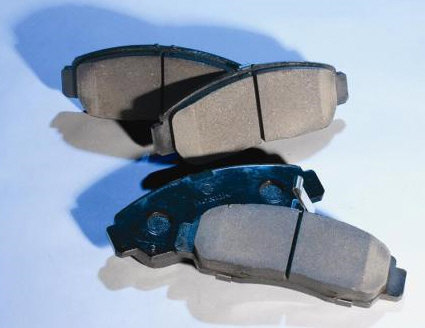
Home, Auto Repair Library, Auto Parts, Accessories, Tools, Manuals & Books, Car BLOG, Links, Index



The rear brake pads on 2008, 2009 and 2010 Honda Accord and TSX models are reportedly wearing out at unusually low mileage, according to various websites that log consumer complaints. The National Highway Traffic Safety Administration has received hundreds of complaints about the rear brake wear problem on the Honda Accord. The rear brake pads, which should normally last around 70,000 miles, are wearing out in as little as 15,000 to 24,000 miles on these vehicles.
When motorists take their vehicle in for repairs, they discover the rear brake pads are NOT covered by warranty. Why? Because brake pads are considered a wear item, so they are not covered by the new vehicle warranty. Honda dealers say the condition is "normal" for these vehicles, and they typically charge around $200 to $250 to replace the worn out rear brake pads.
So why are the rear brake pads wearing out so quickly on these vehicles? Honda is mum on the subject, and has NOT released any technical service bulletins on the problem. But Honda technicians we interviewed said the rear brakes are too small to handle the higher braking load placed on them by Electronic Brake Proportioning. The rear rotors and pads need to be larger, the rear brake calipers also have a tendency to stick and drag, and the friction material used in the original equipment rear brake pads is too soft for this type of application.
The 2008 and newer Honda Accord as well as a number of late model European vehicles, have a new feature that improves braking called Electronic Brake Proportioning. This system applies equal pressure to the front and rear brakes when you step on the brake pedal. By increasing pressure to the rear brakes, the rear brakes contribute more to the overall braking effort, which helps stop the car in a shorter distance and reduces nose dive. If the rear wheels start to lock up, the ABS system kicks in and cycles pressure to the rear brakes to prevent wheel lockup and skidding.
Before Electronic Brake Proportioning was introduced, hydraulic pressure to the rear brakes was reduced by a mechanical proportioning valve. On vehicles without Electronic Brake Proportioning, the front brakes typically handle 70 to 85% of the braking, which means the rear brakes do very little. Consequently, the rear brake shoes or pads are lightly loaded and experience much less wear than the front brake pads. So on older cars, the rear pads often last upwards or 70,000 or more miles, or about two to three times longer than the front linings. But on the newer vehicles with Electronic Brake Proportioning, the rear brakes work much harder, run hotter and wear at a much faster rate. Consequently, it's not unusual to see rear pads on these vehicles that are worn out in as little as 15,000 to 24,000 miles.
The rate at which the rear brake pads wear depend on the type of driving you do. Stop-and-go city driving obviously uses the brake much more than highway driving, so the brake pads will wear faster. Likewise, aggressive driving will shorten the life of the pads.
Symptoms that may indicate worn rear brake pads on a Honda Accord include noise, scraping or metallic sounds from the rear brakes when braking, and increased stopping distance. If you suspect worn rear brake pads, you should have your brakes inspected without delay.
If the rear pads are worn down to about 3mm or less, they need to be replaced.
The rear brake pads on a Honda Accord are fairly easy to replace. After you remove the rear wheels, the calipers can be unbolted and slid off the rotors. The old pads can then be removed and replaced with new pads.
Honda has revised the replacement pads for the 2008 and up Honda Accord so they will last longer. The part number for the new pads from Honda is #43022-TA0-A40. Make sure you get the new pads, and not the older pads with the wear problem, which were #43022-TA0-A00, #43022-TA0-A51 or #43022-TA0-A70.

Numerous aftermarket brake suppliers also have brake pads that will fit the late model Honda Accord. The pads are usually less expensive than the ones Honda sells, and should improve wear if they are a premium material such as a ceramic or high metallic content friction compound. Do NOT buy cheap replacement pads as these will only make the wear problem worse!
Everybody is sue happy these days, so it's not surprising that a class action lawsuit was filed against Honda over the premature rear brake pad wear issue. According to a New York Times report, Honda has agreed to settle the class action suit by offering Honda Accord owners a partial repair reimbursement of one half of the cost of repairs, or a maximum of $125, whichever is less. Honda Accord owners will also receive $150 towards the cost of a set of new rear brake pads from a Honda dealer.
What does Honda get out of the deal? They won't have to issue a recall over the brake wear problem, or acknowledge that anything is wrong with their cars. Honda denies there is a safety defect or that it has done anything wrong.
 More Brake Articles:
More Brake Articles: Click Here to See More Carley Automotive Technical Articles
Click Here to See More Carley Automotive Technical Articles